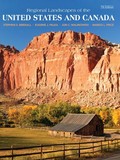

Instructor: Charles A. Heatwole
Email: charles.heatwole@hunter.cuny.edu
Telephone: (212) 772-5323
Office: 1045 HN
Office Hours: Monday, 9 AM to Noon
Tuesday, 2 PM to 5 PM
Thursday, 3 PM to 6 PM
&February 9, 2011quote>
 Readings:
Readings: Text: Stephen S. Birdsall et al., Regional Landscapes of the United States and Canada, 7th ed., John Wiley & Sons, Inc., 2008. ISBN - 13: 978-0-470-09826-4.
Atlas: Any LARGE up-to-date road atlas of the United States and Canada.
Midterm exam - 25% Final exam - 25% Landscape exercise - 25% Trans-continental trip - 25% 100%
This is a Powerpoint-based lecture course that seeks to familiarize students with the regional geography of the United States and Canada. More specifically, the goals are to acquaint you with the
As suggested by the course outline, the course begins with general overview material, and then examines the various sub-regions of the study area in much greater detail, focusing on key characteristics and environmental challenges. GEOG 251 is especially recommended for students who are prospective K-12 teachers. If the course has a major “unofficial” goal, is to increase your desire to travel about the study area whenever you have an opportunity to do so.
- dynamic nature of human and physical features that characterize the study area;
- the ways in which human and natural phenomena interact to create unique place characteristics and sub-regions;
- the key environmental issues that characterize the study area and its constituent parts;
- major trends that are affecting the geography of the two countries; and
- the locations of principal features.
Each is worth 25% of your final grade and consists of the following components that will have roughly equal value: a list of words/terms to be defined; multiple-choice questions; a couple of mini-essays; and a map containing indicated features you will be asked to identify. The final exam is not cumulative, but instead will cover only the second half of the
course.
I take attendance every class session and regard your overall attendance record as a "tie-breaker." That is, if your final average is on the borderline between two letter grades, then I will use your attendance record to determine whether or not I should "round up" and award you the higher grade. Also, a majority of exam questions come from lecture. Thus, poor attendance normally results in a poor final grade.
Hunter College regards acts of academic dishonesty (e.g. plagiarism, cheating on examinations, obtaining unfair advantage, and falsification of records and official documents) as serious offenses against the values of intellectual honesty. The College is committed to enforcing CUNY Policy on Academic Integrity and will pursue cases of academic dishonesty according to the Hunter College Academic Integrity Procedures. Acts of plagiarism, dishonesty, or cheating related to any portion of the work required for this course will be punished to the full extent allowed according to Hunter College regulations. In a nutshell, academic dishonesty is a serious matter. And although I take no pride in telling you this, I once got a CUNY doctoral candidate expelled from the university on account of plagiarism.
No. You are strongly advised to attend every class and take notes. The result will be the best review sheet you could possibly have.